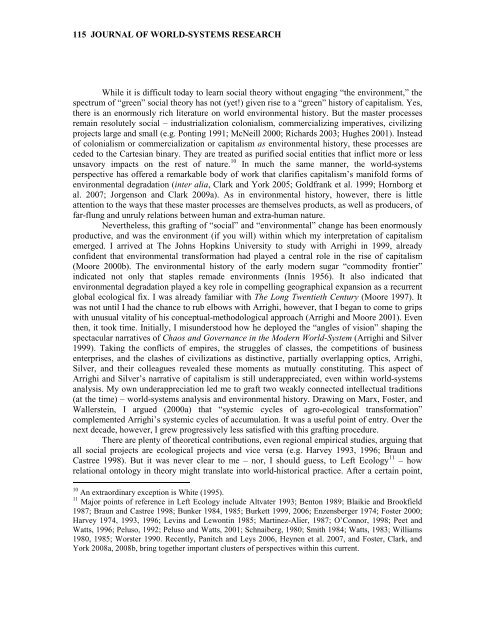Entire Volume 17 issue 1 - Journal of World-Systems Research ...
Entire Volume 17 issue 1 - Journal of World-Systems Research ...
Entire Volume 17 issue 1 - Journal of World-Systems Research ...
Create successful ePaper yourself
Turn your PDF publications into a flip-book with our unique Google optimized e-Paper software.
115 JOURNAL OF WORLD-SYSTEMS RESEARCH<br />
While it is difficult today to learn social theory without engaging “the environment,” the<br />
spectrum <strong>of</strong> “green” social theory has not (yet!) given rise to a “green” history <strong>of</strong> capitalism. Yes,<br />
there is an enormously rich literature on world environmental history. But the master processes<br />
remain resolutely social – industrialization colonialism, commercializing imperatives, civilizing<br />
projects large and small (e.g. Ponting 1991; McNeill 2000; Richards 2003; Hughes 2001). Instead<br />
<strong>of</strong> colonialism or commercialization or capitalism as environmental history, these processes are<br />
ceded to the Cartesian binary. They are treated as purified social entities that inflict more or less<br />
unsavory impacts on the rest <strong>of</strong> nature. 10<br />
In much the same manner, the world-systems<br />
perspective has <strong>of</strong>fered a remarkable body <strong>of</strong> work that clarifies capitalism’s manifold forms <strong>of</strong><br />
environmental degradation (inter alia, Clark and York 2005; Goldfrank et al. 1999; Hornborg et<br />
al. 2007; Jorgenson and Clark 2009a). As in environmental history, however, there is little<br />
attention to the ways that these master processes are themselves products, as well as producers, <strong>of</strong><br />
far-flung and unruly relations between human and extra-human nature.<br />
Nevertheless, this grafting <strong>of</strong> “social” and “environmental” change has been enormously<br />
productive, and was the environment (if you will) within which my interpretation <strong>of</strong> capitalism<br />
emerged. I arrived at The Johns Hopkins University to study with Arrighi in 1999, already<br />
confident that environmental transformation had played a central role in the rise <strong>of</strong> capitalism<br />
(Moore 2000b). The environmental history <strong>of</strong> the early modern sugar “commodity frontier”<br />
indicated not only that staples remade environments (Innis 1956). It also indicated that<br />
environmental degradation played a key role in compelling geographical expansion as a recurrent<br />
global ecological fix. I was already familiar with The Long Twentieth Century (Moore 1997). It<br />
was not until I had the chance to rub elbows with Arrighi, however, that I began to come to grips<br />
with unusual vitality <strong>of</strong> his conceptual-methodological approach (Arrighi and Moore 2001). Even<br />
then, it took time. Initially, I misunderstood how he deployed the “angles <strong>of</strong> vision” shaping the<br />
spectacular narratives <strong>of</strong> Chaos and Governance in the Modern <strong>World</strong>-System (Arrighi and Silver<br />
1999). Taking the conflicts <strong>of</strong> empires, the struggles <strong>of</strong> classes, the competitions <strong>of</strong> business<br />
enterprises, and the clashes <strong>of</strong> civilizations as distinctive, partially overlapping optics, Arrighi,<br />
Silver, and their colleagues revealed these moments as mutually constituting. This aspect <strong>of</strong><br />
Arrighi and Silver’s narrative <strong>of</strong> capitalism is still underappreciated, even within world-systems<br />
analysis. My own underappreciation led me to graft two weakly connected intellectual traditions<br />
(at the time) – world-systems analysis and environmental history. Drawing on Marx, Foster, and<br />
Wallerstein, I argued (2000a) that “systemic cycles <strong>of</strong> agro-ecological transformation”<br />
complemented Arrighi’s systemic cycles <strong>of</strong> accumulation. It was a useful point <strong>of</strong> entry. Over the<br />
next decade, however, I grew progressively less satisfied with this grafting procedure.<br />
There are plenty <strong>of</strong> theoretical contributions, even regional empirical studies, arguing that<br />
all social projects are ecological projects and vice versa (e.g. Harvey 1993, 1996; Braun and<br />
Castree 1998). But it was never clear to me – nor, I should guess, to Left Ecology 11<br />
– how<br />
relational ontology in theory might translate into world-historical practice. After a certain point,<br />
10<br />
An extraordinary exception is White (1995).<br />
11<br />
Major points <strong>of</strong> reference in Left Ecology include Altvater 1993; Benton 1989; Blaikie and Brookfield<br />
1987; Braun and Castree 1998; Bunker 1984, 1985; Burkett 1999, 2006; Enzensberger 1974; Foster 2000;<br />
Harvey 1974, 1993, 1996; Levins and Lewontin 1985; Martinez-Alier, 1987; O’Connor, 1998; Peet and<br />
Watts, 1996; Peluso, 1992; Peluso and Watts, 2001; Schnaiberg, 1980; Smith 1984; Watts, 1983; Williams<br />
1980, 1985; Worster 1990. Recently, Panitch and Leys 2006, Heynen et al. 2007, and Foster, Clark, and<br />
York 2008a, 2008b, bring together important clusters <strong>of</strong> perspectives within this current.





